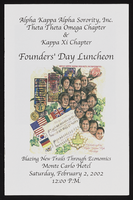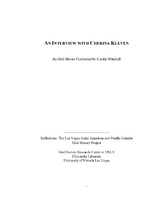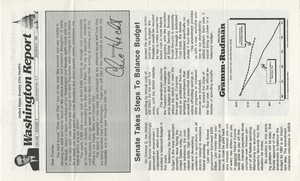Search the Special Collections and Archives Portal
Search Results

Charissa B. Fabian oral history interview: transcript
Date
Archival Collection
Description
Oral history interview with Charissa B. Fabian conducted by Kyle Gregory Baluyut on November 24, 2021 for Reflections: The Las Vegas Asian American and Pacific Islander Oral History Project. In this interview, Charissa B. Fabian discusses her upbringing in Angeles City, Pampanga, Philippines with her three siblings and memories shared with her grandparents and cousins. She talks about her nursing education from the University of the Philippines and her immigration via a recruitment agency to work in New York. Charissa Fabian reflects on her move to Las Vegas, Nevada with her husband in 1995, the growing Filipino population in the city, and her work as a nurse. She also shares her thoughts on the immigration process, the COVID-19 pandemic, and politics.
Text

Interview with George Robert Maynard, Sr., January 26, 2004
Date
Archival Collection
Description
Text

Interview with Theresa Dorothy (Healy) Maynard, January 26, 2004
Date
Archival Collection
Description
Text

Jill Roberts oral history interview: transcript
Date
Archival Collection
Description
Oral history interview with Jill Roberts conducted by Barbara Tabach and Claytee D. White on March 20, 2018 for the Remembering 1 October Oral History Project. In this interview, Jill Roberts discusses her position as the CEO of the Trauma Intervention Program (TIP) of Southern Nevada. She also delves into her part-time work at the coroner's office as a death investigator and discusses her personal background in Las Vegas, Nevada after she moved to the city in 1977. She describes the role TIP had during the aftermath of the October 1, 2017 mass shooting, where well-trained volunteers were dispatched to hotels, hospitals, and anywhere else the survivors reached in order to provide emotional and practical support. Throughout the interview, Roberts emphasizes that the assistance provided to those in a traumatic event depends on each individual's needs. She shares a few examples of what the TIP volunteers had helped with after the shooting, including listening to the survivors' stories as well as providing information on the situation, helping separated loved ones find each other, arranging travel for some survivors to go back to their homes, and procuring clothes and shoes for those who needed them. Roberts also discusses the gratitude TIP had received after the shooting, including the thank you cards sent by Sandy Hook High School.
Text

Christina Gruber oral history interview: transcript
Date
Archival Collection
Description
Oral history interview with Christina Gruber conducted by Barbara Tabach on March 2, 2019 for the Remembering 1 October Oral History Project. In this interview, Gruber shares her experience living in Las Vegas, Nevada since 1997 and as a Certified Public Accountant (CPA), mother of two, and physical fitness enthusiast. She recalls being shot during the Route 91 Harvest Festival and being rescued by strangers. She recalls the chaos of the evening, but also how strangers worked together to comfort each other amidst the terror. She discusses dedicated her athletic races to those who were murdered that evening, and how it has helped her recovery.
Text

Paul Velez oral history interview: transcript
Date
Archival Collection
Description
Oral history interview with Paul Velez conducted by Barbara Tabach on February 22, 2018 for the Remembering 1 October Oral History Project. In this interview, Paul Velez, a University of Nevada, Las Vegas (UNLV) campus officer, discusses his experience at the Thomas & Mack Center during the night of the October 1, 2017 mass shooting in Las Vegas, Nevada. He shares his goal of creating a safe atmosphere for the survivors and providing them with all of their needs, including helping separated survivors find their loved ones and friends. Velez also describes his move to Las Vegas in 2008 and his time with the New York City police force, talking about his experience as a first responder at Ground Zero during the 9/11 attacks. He discusses the effect these attacks have had on general and campus security measures and on him as an individual.
Text

Alpha Kappa Alpha Sorority, Theta Theta Omega Chapter Founders' Day committee reports
Date
Archival Collection
Description
From the Alpha Kappa Alpha Sorority, Incorporated, Theta Theta Omega Chapter Records (MS-01014) -- Chapter records file.
Text

Transcript of interview with Elizabeth "Betty" Krolak by Irene Rostine, September 26, 1995
Date
Archival Collection
Description
In 1962, Elizabeth “Betty” Krolak moved from the Midwest to Las Vegas with her husband and six children. Not only would the drier desert climate benefit her youngest daughter’s health due to asthma, but the family hoped the Las Vegas economy would be beneficial for their future. Prior to her arrival in Las Vegas, Betty worked briefly as a secretary for the New York Central Railroad before becoming a stay-at-home mom and active member of the PTA. Upon their arrival in Las Vegas, Betty’s husband enrolled in a real estate class, but was unable to complete the program. Betty, not wanting to waste the $80 they had spent on the class, decided to attend in his place. This decision led to life changing events for Betty and her family over the next four decades. After taking the real estate class and passing the test, Betty became a licensed Nevada real estate broker in October of 1963. She initially went to work for Pyramid Realty and, in 1964, she opened her own office, Clark County Realty. After her divorce in 1967, Betty was left with “six hungry children” to feed and no child support or health insurance. She recalls how the benefits of being in real estate really became apparent during this period of her life. While real estate required long hours seven days a week, it also afforded a single mother flexibility that other careers would not have offered. Likewise, a woman could make more money in real estate in the 1960s and 1970s than most other careers provided, which was particularly important for Betty who was committed to raising her children without public assistance. Betty’s oral history chronicles the growth of the Las Vegas Board of Realtors which has grown into what today is the Greater Las Vegas Association of Realtors (GLVAR). She recalls how, in the 1960s, meetings took place in bowling allies and the primary role of the GLVAR was to provide networking opportunities and represent the Code of Ethics for realtors. However, the Board was dominated by males, with the role of women members confined to planning social events and arranging for refreshments. In 1968, Betty and several other women realtors set out to change this by initially establishing a local Women’s Council within the Board. In the years following, Betty became the first women to be an Executive Board Member. Today, more than half the members of the Executive Board are women. Betty’s oral history also speaks to many changes within the real estate industry over the past four decades, some positive and some not so positive. She recounts the 1960s to the 1980s, when casino workers’ main source of income came from tips which were often unreported, creating challenges in getting casino workers qualified for home loans because they did not have the ability to document their source of income. Likewise, single women had a hard time qualifying for home loans because they only had one income and, in those days, it rarely was enough to qualify for a mortgage on their own. Also during this period, realtors primarily focused on the resale market because builders wanted to work directly with buyers, but changes in the real estate market eventually led builders to realize the benefits of allowing realtors to sell new houses, too. During her career, Betty also experienced the rise of real estate franchises, beginning with Century 21’s arrival in Nevada, the development of Multiple Listing Service (MLS), changes to educational requirements, approaches to settling disputes, and new approaches to ethics violations. Perhaps the biggest change Betty’s oral history speaks to is the personal approach to selling real estate that has been lost over time. In the early days, brokers sold houses right alongside the sales agents. Today, however, regulations have placed brokers in a position where their primary role is to manage sales people, not sell houses. Also, realtors used to interact with other realtors, title company personnel, and mortgage lenders before technology, such as fax machines and computers, came along. In the early days, documents were transferred in person allowing people in the industry to get to know one another through these personal interactions. Today, everything is done electronically and it is rare to actually know the person on the other end. Selling real estate has lost a lot of its personal touch, according to Betty. In addition to being the mother of six children and running one of the largest real estate offices in the area, Betty also found time to give back to the community through her volunteer work with the Salvation Army. She was instrumental in establishing Southern Nevada’s Angel Tree project, which provides Christmas presents to children who otherwise would not receive them. She was also appointed by Governor Michael O’Callahan to the State of Nevada’s Real Estate Commission, making her the first woman to serve on the Commission. Betty’s career in real estate allowed her to witness and implement many changes that still impact the industry today. When Betty began her career, Las Vegas’ population was just over 45 thousand. By the mid-1990s Green Valley, Spring Valley, North Las Vegas, Summerlin, and Sun City had been developed and the Valley’s population exceeded 1 million people. Betty Krolak’s career merged with the real estate boom as she helped find homes for those who wanted to make Las Vegas their home. She made sure the real estate industry’s growth included women, training mechanisms, and ethics which continue to benefit realtors, home buyers, and home sellers to this day.
Text

Cherina Kleven oral history interview: transcript
Date
Archival Collection
Description
Oral history interview with Cherina Kleven conducted by Cecilia Winchell on June 9, 2021 for Reflections: The Las Vegas Asian American and Pacific Islander Oral History Project. Cherina Kleven talks about her family and childhood growing up in Taiwan amongst six siblings. She shares her family's history and how they immigrated to Las Vegas while she was a teen, as well as her employment history and how she met her husband. Cherina talks about racial and gender discrimination and the obstacles she has overcome to be the only working female in her family, the only woman firefighter at her station house, and the first female Asian American Assistant Fire Chief in the United States.
Text

